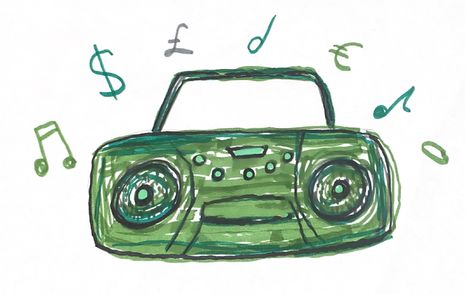How to Critique Commodified Music
Lara Moran looks at the role of criticism in mass-commodified media through the work of Michael Robbins

One of the difficulties in writing about popular music as art is that it was often not conceived as such. Poet and critic Michael Robbins puts it very concisely when he contends that pop represents “a watermarked wing of consumer capitalism structurally restricted to dreams of utopia.” This is quite a damning judgement and makes the idea of having intense attachments to music calculated for mass-appeal seem perverse and embarrassing – yet few of us can help it. While online discourse is still stuck on the motto “let people enjoy things!” and its corresponding backlash, critics such as Robbins offer much more insightful interrogations of the relationship between commercial music and the complex emotional responses it can inspire.
Take Robbins’ own essay about his love for Journey (of all bands…):
[“Don’t Stop Believing”] cascades from whoosh to whoosh […] Like its ‘small town girl’ and ‘city boy from South Detroit’ – a section of Detroit that exists only in the mind of Steve Perry – the song might go anywhere, do anything, as long as it’s somewhere bigger, something gaudier. […] as I listen to “Don’t Stop Believing” today, once again, in the arena of my soul, how high that highest Bic lights the dark.
Robbins’ piece “Journey Force” explores 80s fan culture, the band’s reception, his own critical upbringing, the blinding power of live performance and the implications of “Don’t Stop Believing”. which will now forever be associated with the final episode of The Sopranos. Robbins writes with more cutting insight than the nostalgia and breathless italics of this extract might suggest, but his style only underscores the central point of his essay – that sometimes, against your own better judgement, you cannot help falling in love with “a band too heedlessly excited about its dumbest ideas.”

The essay appears in Robbins’ 2014 collection Equipment for Living: On Poetry and Pop Music, a book of criticism that is just removed enough from contemporary academic debate to be both rigorous and actually interesting. As in his poetry, Robbins careens between references to high and low culture with indiscriminate glee that sometimes threatens to become self-indulgent (Boethius, Bob Dylan, Miley Cyrus and Harold Bloom are just a few names that appear in the introductory essay).Yet, if your prose is good enough, you can get away with anything, and Robbins lands his sentences with the triumphant assurance of the bridge in a Taylor Swift song.
“If your prose is good enough, you can get away with anything”
Music journalist and critical icon Greil Marcus was one of the first to pioneer this style of writing about popular music as an essential part of the cultural landscape that only a snob or an idiot would separate from other art, and he stands out as a major influence on Robbins’ critical sensibility. In the introduction to his own 1995 essay collection The Dustbin of History, Marcus writes that criticism “has a good deal to do with a willingness to be fooled, to take an idea too far, to bet too much on too small an object or occasion, to be caught up and even swept away.”
Michael Robbins, clearly, is of the same tradition and what both critics achieve in their writing is a balancing act between high and low culture that thoughtfully argues for finding joy in pop music beyond the limited framework of “guilty pleasure”. One reason this argument is successful is that their criticism has no illusions about art’s political potential: Robbins’ leftist ideals are apparent throughout his collection, but he admits that “poetry, alas, can’t do a damn thing about capitalism.” That kind of pragmatism allows for engaging and sophisticated explorations of what listeners can get out of commercial music, without being too caught up in trying to justify it academically, morally or politically.
What this style of criticism thus encourages, perhaps more so than any other, is a sensitivity to the influence of personal biases. What I love about pop music is what many people hate about it: that it is simple and empty and often so clichéd that it is almost, but not quite, content-less. It is hollow enough to contain whatever emotions you want to project onto it. In his 1980 review of Roxy Music’s album Flesh + Blood, a piece of writing almost as vibrantly evocative of summer as the album itself, Greil Marcus writes that “Like a perfect July day, [the record] makes no demands on a listener, yet it can give a listener everything.” It is ambiguous, here, how much the music is giving and how much Marcus is bringing to it, and up to each reader to decide for themselves . Flesh + Blood was a perfect commercial success, but listening to it today you might either find it to be full of dull clichés or true to Marcus’ review – pure pleasure, articulated.
 News / Pembroke to convert listed office building into accom9 December 2025
News / Pembroke to convert listed office building into accom9 December 2025 News / Gov declares £31m bus investment for Cambridge8 December 2025
News / Gov declares £31m bus investment for Cambridge8 December 2025 Features / Searching for community in queer Cambridge10 December 2025
Features / Searching for community in queer Cambridge10 December 2025 News / Uni redundancy consultation ‘falls short of legal duties’, unions say6 December 2025
News / Uni redundancy consultation ‘falls short of legal duties’, unions say6 December 2025 Lifestyle / Into the groove, out of the club9 December 2025
Lifestyle / Into the groove, out of the club9 December 2025










